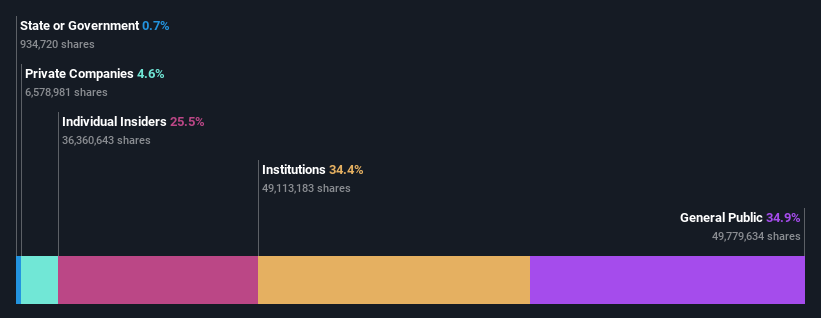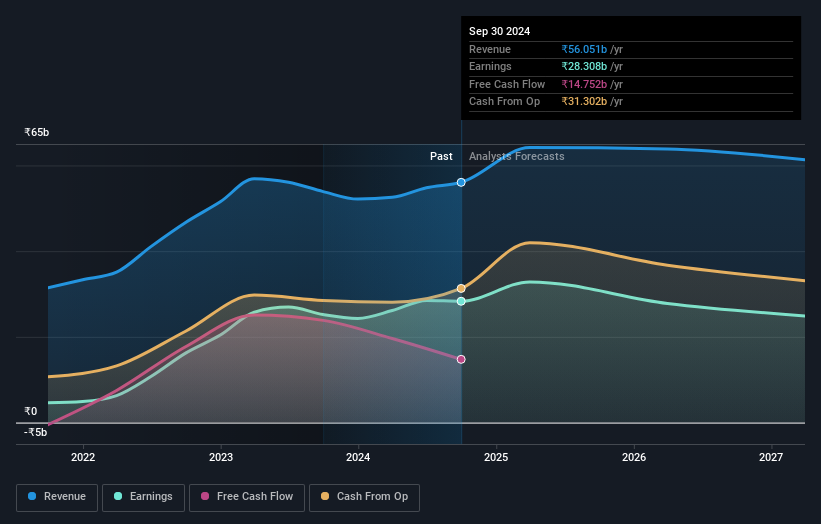- India
- /
- Oil and Gas
- /
- NSEI:GESHIP
Institutions along with individual investors who hold considerable shares inThe Great Eastern Shipping Company Limited (NSE:GESHIP) come under pressure; lose 5.8% of holdings value

Key Insights
- The considerable ownership by individual investors in Great Eastern Shipping indicates that they collectively have a greater say in management and business strategy
- A total of 12 investors have a majority stake in the company with 51% ownership
- Insiders own 25% of Great Eastern Shipping
Every investor in The Great Eastern Shipping Company Limited (NSE:GESHIP) should be aware of the most powerful shareholder groups. And the group that holds the biggest piece of the pie are individual investors with 35% ownership. In other words, the group stands to gain the most (or lose the most) from their investment into the company.
While institutions who own 34% came under pressure after market cap dropped to ₹138b last week,individual investors took the most losses.
Let's take a closer look to see what the different types of shareholders can tell us about Great Eastern Shipping.
View our latest analysis for Great Eastern Shipping

What Does The Institutional Ownership Tell Us About Great Eastern Shipping?
Many institutions measure their performance against an index that approximates the local market. So they usually pay more attention to companies that are included in major indices.
We can see that Great Eastern Shipping does have institutional investors; and they hold a good portion of the company's stock. This implies the analysts working for those institutions have looked at the stock and they like it. But just like anyone else, they could be wrong. It is not uncommon to see a big share price drop if two large institutional investors try to sell out of a stock at the same time. So it is worth checking the past earnings trajectory of Great Eastern Shipping, (below). Of course, keep in mind that there are other factors to consider, too.

Hedge funds don't have many shares in Great Eastern Shipping. Ravi Sheth is currently the largest shareholder, with 12% of shares outstanding. For context, the second largest shareholder holds about 11% of the shares outstanding, followed by an ownership of 5.1% by the third-largest shareholder. Bharat Sheth, who is the second-largest shareholder, also happens to hold the title of Chief Executive Officer.
A closer look at our ownership figures suggests that the top 12 shareholders have a combined ownership of 51% implying that no single shareholder has a majority.
Researching institutional ownership is a good way to gauge and filter a stock's expected performance. The same can be achieved by studying analyst sentiments. There is some analyst coverage of the stock, but it could still become more well known, with time.
Insider Ownership Of Great Eastern Shipping
The definition of company insiders can be subjective and does vary between jurisdictions. Our data reflects individual insiders, capturing board members at the very least. Company management run the business, but the CEO will answer to the board, even if he or she is a member of it.
Most consider insider ownership a positive because it can indicate the board is well aligned with other shareholders. However, on some occasions too much power is concentrated within this group.
Our information suggests that insiders maintain a significant holding in The Great Eastern Shipping Company Limited. Insiders own ₹35b worth of shares in the ₹138b company. That's quite meaningful. Most would be pleased to see the board is investing alongside them. You may wish to access this free chart showing recent trading by insiders.
General Public Ownership
The general public-- including retail investors -- own 35% stake in the company, and hence can't easily be ignored. While this group can't necessarily call the shots, it can certainly have a real influence on how the company is run.
Private Company Ownership
We can see that Private Companies own 4.6%, of the shares on issue. It might be worth looking deeper into this. If related parties, such as insiders, have an interest in one of these private companies, that should be disclosed in the annual report. Private companies may also have a strategic interest in the company.
Next Steps:
It's always worth thinking about the different groups who own shares in a company. But to understand Great Eastern Shipping better, we need to consider many other factors. For instance, we've identified 3 warning signs for Great Eastern Shipping (1 is concerning) that you should be aware of.
Ultimately the future is most important. You can access this free report on analyst forecasts for the company.
NB: Figures in this article are calculated using data from the last twelve months, which refer to the 12-month period ending on the last date of the month the financial statement is dated. This may not be consistent with full year annual report figures.
New: Manage All Your Stock Portfolios in One Place
We've created the ultimate portfolio companion for stock investors, and it's free.
• Connect an unlimited number of Portfolios and see your total in one currency
• Be alerted to new Warning Signs or Risks via email or mobile
• Track the Fair Value of your stocks
Have feedback on this article? Concerned about the content? Get in touch with us directly. Alternatively, email editorial-team (at) simplywallst.com.
This article by Simply Wall St is general in nature. We provide commentary based on historical data and analyst forecasts only using an unbiased methodology and our articles are not intended to be financial advice. It does not constitute a recommendation to buy or sell any stock, and does not take account of your objectives, or your financial situation. We aim to bring you long-term focused analysis driven by fundamental data. Note that our analysis may not factor in the latest price-sensitive company announcements or qualitative material. Simply Wall St has no position in any stocks mentioned.
About NSEI:GESHIP
Great Eastern Shipping
Through its subsidiaries, engages in the shipping and offshore businesses in India and internationally.
Flawless balance sheet, undervalued and pays a dividend.
Market Insights
Community Narratives



